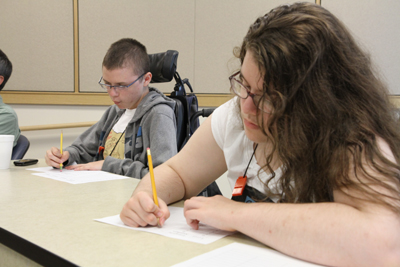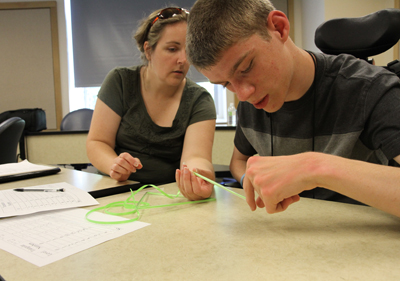The Thread: Preparing For College
I wanted to share with you a question posed by a DO-IT Ambassador in our Internet discussion forum and some of the responses so that you can get the flavor of the many rich conversations the DO-IT community has online. Some forum posts are edited for clarity and brevity.

One aspect of having a disability and going to college I hadn't thought about was the massive amount of work and organizing that needs to get done before you actually go to college. So far I've spent heaps of time working with counselors, checking class waitlists, organizing my dorm situation, and ensuring I get the accommodations I need from the disability office. If I could do this whole process again, I would have started preparing as early as possible, because towards the end of the summer a lot of the resources are already taken and university staff get busy and have less time to help you.
DO-IT Ambassador: I think what you are saying is really true. There is a lot of work and organizing before you go to college, and there is also a lot of ongoing work after you get there just to keep receiving the same services. Sometimes it feels like starting over again every quarter. It can seem like the paperwork and meetings and information sessions never end. For me this is stressful. I have some tips, though.
- In high school, make a folder of all your paperwork including your final Individualized Education Program documents, evaluations, transcripts, PSAT/SAT/ACT scores, nice photos of yourself, a resume, and a list of every single activity you do. Take it to all college disability office meetings. Also include copies of every college application and disability office application. To be prepared, I keep two copies of everything in my folder for meetings.
- Ask your high school and any colleges to mail official copies of your transcript to your home in a sealed envelope. That way if you ever need them in a meeting (or on a Friday night when you are mailing in applications), they are handy. Some people want them directly from the school but others such as some scholarships are okay as long as the envelopes are sealed and signed. You can also scan one of them and send the file to those who accept an unofficial copy.
- Even if the disability office only wants official forms, include a cover letter. In the cover letter, note who you are and what things you want and need in order to learn and why. Mail it to them or staple it to the application you fill out on campus. Don't be limited by forms. It is important to explain how your disability impacts your learning and, most important, what you do to overcome it. Translating your disability for your professors and the disability office really helps them. You can also attach a letter from a doctor explaining or recommending anything beyond what is included on the forms.
- Introduce yourself to professors via email. I use a similar email for every professor every quarter, so it's not much work after you've done it the first time. I tell them about my autism and ask if I can meet them before the quarter starts.
- When I meet with the new professor, I take a copy of a letter from me (which is the same thing from my email plus a little more detail) and give it to them. We talk about it. I ask them if they have any questions for me. I also let them know that they will receive an official email from the disability services office soon. This usually happens the next day if I get my timing right. I have learned that even after the initial meeting and the official email, I need to return for yet another meeting to officially request the accommodations from the professor. There is a certain order in to how you have to ask.
- Meet every deadline. Being early is better because as noted in the original post, the disability services office gets very busy, especially with people who procrastinate.
- I think that relationships are important. Make a friend in the disability services office at the colleges you might want to go to. Meet them in person and get their business card so you know their phone number, address, and email. Send a thank you note after the first meeting. Keep them informed about how your application is going or ask them a question. I found out at one school that sometimes the person there has flexibility to recommend a special placement test you should take instead of the standard one. If you are going to need ongoing accommodations to be successful and you do not get along with the people in the disability services office, I would think twice about going to that college.
- Relationships help with scholarships too. I sent a letter to the scholarship person at each college telling them about my disability and explaining ahead of time even before I took the ACT that I knew there would be a difference between my grades and my standardized test scores. Schools decide on scholarships based on both, but I wanted them to give me more credit for the grades, including Running Start (which proved I could handle college work). When I wrote the letter I tried to put myself in their shoes and think about how they could use it to advocate for me in a meeting, so I put in sound bites or phrases. One lady called and thanked me for the letter because she had just come from a scholarship committee meeting, and she had my letter with her there, and it had made her feel really prepared to support me. She was able to just read from it to convince the group about giving me a scholarship!It was sort-of a script in my own words about why my test scores weren't as high as most people's due to my disability. They offered me a great scholarship.
- The disability services office rules lots of things you wouldn't think about. I don't know how things work at other schools, but I learned that the disability office is in charge of your dorm accommodations if you originally requested something through them such as a private room. When I went to the housing office and asked to move out of the dorm because of the noise, the first thing the housing person asked was if I had gone to the disability services office. I had not thought of going there first, and it wasn't documented on their website as part of the process, and it caused a delay, but the housing people needed to hear from them directly before they would talk to me. Fortunately, I had a good relationship with the disability services office and they supported my request to change. As soon as they said to do it, the housing office did it instantly.
- Be ahead of the system. One great thing my university offers for students with disabilities is early registration. For me this has been a mess because even though I am always ready to sign up on the date they tell me to, most of my courses (for music majors) are not available to all students, so I need a permission code to register. But the school never seems to send out permission codes to faculty in time for early registration. So I am always going around to the professors, sometimes for courses I haven't taken yet so they don't even know me, and begging them for codes to get into their class. I try to make this an opportunity to introduce myself and give them my own personal disability letter. I have also learned that sometimes not even the registrar's office is ready for early-registering students, such as for winter quarter last year I was the very first person at the whole university to login and try to register. So, even though you have to do everything by the rules, sometimes the people on the other side aren't ready to follow their rules. But don't give up.
- For your scholarship file, make a spreadsheet of your most important activities such as clubs or projects and how much time you spend on them. I have one that's divided between volunteering and other things like music lessons and performances. I also divide it between things at my school and outside of school because some applications want it split. I try to sit down once or twice every month and update it.
- One final thing I have learned in college is that when you are really positive, proactive, and honest about yourself and show a strong desire to learn, sometimes instructors will accommodate you even without going through the disability services office. This is not the normal thing and I don't recommend it but I have had it happen to me. If they understand that you are not asking for anything unfair to other students, they might make up their own mind that you are being reasonable. I have also had teachers go way beyond what is officially required and offer things that help me relax, such as letting me do individual projects instead of group ones even when my accommodations don't require it. If they see you trying, and they know you care more about learning than just about grades, they like that! Good luck to everyone in college!

DO-IT Ambassador: I agree with the previous poster. I have used most of these tips as well such as emailing professors, having a filing system, arranging meetings with professors, etc. I will have to try the cover letter idea for disability services for grad school since I really like that idea. Dorm issues aren't there for me but registration is. Go see your adviser at least a month early to get your classes arranged. At my school you need documentation for all of the disability services or official school changes so ask them specifically what they need for disability services, scholarships, etc. I needed to do this with my hardship withdrawal and tuition forfeiture. I really do emphasize connecting with real people, which is hard with a system but do it anyway. I often use school officials for job references. Be patient and always check on all correspondence.
DO-IT Mentor: I always have found it handy to visit campus (before the first day of campus) to locate classrooms. This always made me feel more comfortable the first few days of the term!
DO-IT Ambassador: Always talk to your professors. If you feel the need, set up a weekly meeting to discuss assignments and how you feel about the class activities and what you might be struggling with.
DO-IT Ambassador: Buy spare printer ink so you won't run out at 11 p.m.
DO-IT Ambassador: Use a detailed schedule of things to do. Color code it if you it helps. You think you'd remember things in your head, but you really don't.